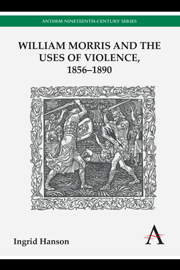Book contents
- Frontmatter
- Contents
- Acknowledgements
- Introduction Warriors Waiting for the Word
- Chapter One The Early Romances and the Transformative Touch of Violence
- Chapter Two Knightly Women and the Imagination of Battle in The Defence of Guenevere, and Other Poems
- Chapter Three Sigurd the Volsung and the Parameters of Manliness
- Chapter Four Crossing the River of Violence: The Germanic Antiwars and the Uncivilized Uses of Work and Play
- Chapter Five ‘All for the Cause’: Fellowship, Sacrifice and Fruitful War
- Afterword ‘Hopeful Strife and Blameless Peace’
- Notes
- Bibliography
- Index
Afterword - ‘Hopeful Strife and Blameless Peace’
Published online by Cambridge University Press: 05 July 2013
- Frontmatter
- Contents
- Acknowledgements
- Introduction Warriors Waiting for the Word
- Chapter One The Early Romances and the Transformative Touch of Violence
- Chapter Two Knightly Women and the Imagination of Battle in The Defence of Guenevere, and Other Poems
- Chapter Three Sigurd the Volsung and the Parameters of Manliness
- Chapter Four Crossing the River of Violence: The Germanic Antiwars and the Uncivilized Uses of Work and Play
- Chapter Five ‘All for the Cause’: Fellowship, Sacrifice and Fruitful War
- Afterword ‘Hopeful Strife and Blameless Peace’
- Notes
- Bibliography
- Index
Summary
In 1885, the popular adventure novelist, G. A. Henty, urged his young readership to take pleasure in tales of war: ‘It is sometimes said that there is no good to be obtained from tales of fighting and bloodshed […]. Believe it not. War has its lessons as well as Peace’. This acknowledges the existence of a counterargument, that stories of war may not be ‘good’, while affirming the basis of his own writing and preparing boys for the willingness to sacrifice that would lead them into the First World War. This comment is made in the preface to Henty's St George for England, a novel that draws, as Morris does, on Froissart's stories of the Hundred Years' War. Henty goes on to praise the courage, chivalry and martial spirit of the fourteenth century and to lament their loss in the present. While the ideologies Henty espouses may be very different from Morris's, the underlying emphasis on the important qualities engendered by fighting and indeed, specifically, by tales of ancient fighting runs across such imperialist narratives as Henty's and the anticapitalism of Morris's work. Morris himself delights in tales of war and offers them in turn to his readers as a means both of pleasure and of personal and social transformation, as this book has argued.
- Type
- Chapter
- Information
- William Morris and the Uses of Violence, 1856–1890 , pp. 167 - 172Publisher: Anthem PressPrint publication year: 2013



